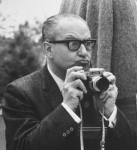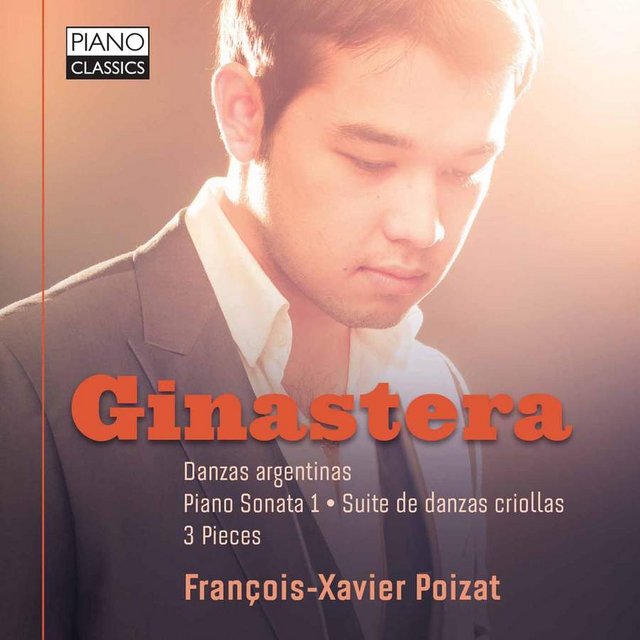Searched for this thread and I could not find it.....so here it is, ready made and ready to go!
![]()
From Boosey and Hawkes:
Long Biography: Alberto Ginastera was the leading Argentinian composer of the twentieth century, as important in giving the Argentinian folk heritage a voice in art music as Bartók was in Hungary. Ginastera was born in Buenos Aires on 11 April 1916 (his father being Catalan, he preferred to pronounce his surname with a soft 'g'). He studied musical privately as a child, later enrolling at the National Conservatoire of Music in his home city. His first compositions date from his early youth; he was 22 when his Piezas infantiles for piano won first prize in a competition. The works which followed initially developed the nationalist tendencies announced in the Piezas infantiles, as such titles as Concierto argentino and Sinfonía Porteña reveal - both scores later withdrawn by the composer, as were a number of other early pieces.
In 1946-47 Ginastera spent a year in the United States on a Guggenheim fellowship, joining the teaching staff of the National Conservatory upon his return home; he was later the Dean of the Faculty of Musical Arts and Sciences at the Catholic University. His first opera, Don Rodrigo, was premiered to immediate acclaim in 1966 and was soon followed by two others, Bomarzo (1967) and Beatrix Cenci (1971). Bomarzo attracted attention through what Nicolas Slonimsky calls 'its unrestrained spectacle of sexual violence' though, as Slonimsky further points out, it also 'reveals extraordinary innovations in serial techniques, with thematic employment not only of different chromatic sounds but also of serial progressions of different intervals'. (A fourth opera, Barrabas, was unfinished at the time of his death.) In 1969, finding himself out of sympathy with the prevailing political climate in Argentina (indeed, he was twice ejected from his academic posts because of his protests against the repressive regime), Ginastera left the country, settling in Geneva with his second wife, the cellist Aurora Natola.
In the early 1950s the nationalist element in his music gradually lost its dominance, and more explicitly modernist characteristics began to make their presence felt in what Ginastera called his 'neo-expressionistic period'. He actively adopted the twelve-tone technique and his works also incorporated microtones and polytonality. By the time of his death, on 25 June 1983, his modernism had softened, and he began to look again at the tonality and folk-music inflexions of his early output.
Anyone recommend any recordings? Favourite works?

From Boosey and Hawkes:
Long Biography: Alberto Ginastera was the leading Argentinian composer of the twentieth century, as important in giving the Argentinian folk heritage a voice in art music as Bartók was in Hungary. Ginastera was born in Buenos Aires on 11 April 1916 (his father being Catalan, he preferred to pronounce his surname with a soft 'g'). He studied musical privately as a child, later enrolling at the National Conservatoire of Music in his home city. His first compositions date from his early youth; he was 22 when his Piezas infantiles for piano won first prize in a competition. The works which followed initially developed the nationalist tendencies announced in the Piezas infantiles, as such titles as Concierto argentino and Sinfonía Porteña reveal - both scores later withdrawn by the composer, as were a number of other early pieces.
In 1946-47 Ginastera spent a year in the United States on a Guggenheim fellowship, joining the teaching staff of the National Conservatory upon his return home; he was later the Dean of the Faculty of Musical Arts and Sciences at the Catholic University. His first opera, Don Rodrigo, was premiered to immediate acclaim in 1966 and was soon followed by two others, Bomarzo (1967) and Beatrix Cenci (1971). Bomarzo attracted attention through what Nicolas Slonimsky calls 'its unrestrained spectacle of sexual violence' though, as Slonimsky further points out, it also 'reveals extraordinary innovations in serial techniques, with thematic employment not only of different chromatic sounds but also of serial progressions of different intervals'. (A fourth opera, Barrabas, was unfinished at the time of his death.) In 1969, finding himself out of sympathy with the prevailing political climate in Argentina (indeed, he was twice ejected from his academic posts because of his protests against the repressive regime), Ginastera left the country, settling in Geneva with his second wife, the cellist Aurora Natola.
In the early 1950s the nationalist element in his music gradually lost its dominance, and more explicitly modernist characteristics began to make their presence felt in what Ginastera called his 'neo-expressionistic period'. He actively adopted the twelve-tone technique and his works also incorporated microtones and polytonality. By the time of his death, on 25 June 1983, his modernism had softened, and he began to look again at the tonality and folk-music inflexions of his early output.
Anyone recommend any recordings? Favourite works?









